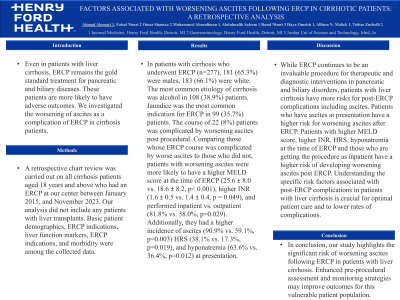Monday Poster Session
Category: Interventional Endoscopy
P2766 - Factors Associated With Worsening Ascites Following ERCP in Cirrhotic Patients: A Retrospective Analysis
Monday, October 28, 2024
10:30 AM - 4:00 PM ET
Location: Exhibit Hall E

Has Audio

Ahmad Alomari, MD
Henry Ford Hospital
Detroit, MI
Presenting Author(s)
Ahmad Alomari, MD1, Faisal Nimri, MD1, Omar Shamaa, MD2, Mohammed Abusuliman, MD2, Abdulmalik Saleem, MD2, Rund Nimri, MD3, Haya Omeish, MD2, Allison N. Malick, MD2, Tobias Zuchelli, MD1
1Henry Ford Hospital, Detroit, MI; 2Henry Ford Health, Detroit, MI; 3Jordan University of Science and Technology, Irbid, Irbid, Jordan
Introduction: Even in patients with liver cirrhosis, ERCP remains the gold standard treatment for pancreatic and biliary diseases. These patients are more likely to have adverse outcomes. We investigated the worsening of ascites as a complication of ERCP in cirrhosis patients.
Methods: A retrospective chart review was carried out on all cirrhosis patients aged 18 years and above who had an ERCP at our center between January 2015, and November 2023. Our analysis did not include any patients with liver transplants. Basic patient demographics, ERCP indications, liver function markers, ERCP indications, and morbidity were among the collected data.
Results: In patients with cirrhosis who underwent ERCP (n=277), 181 (65.3%) were males, 183 (66.1%) were white. The most common etiology of cirrhosis was alcohol in 108 (38.9%) patients. Jaundice was the most common indication for ERCP in 99 (35.7%) patients. The course of 22 (8%) patients was complicated by worsening ascites post procedural. Comparing those whose ERCP course was complicated by worse ascites to those who did not, patients with worsening ascites were more likely to have a higher MELD score at the time of ERCP (25.6 ± 8.0 vs. 18.6 ± 8.2, p< 0.001), higher INR (1.6 ± 0.5 vs. 1.4 ± 0.4, p = 0.049), and performed inpatient vs. outpatient (81.8% vs. 58.0%, p=0.029). Additionally, they had a higher incidence of ascites (90.9% vs. 59.1%, p=0.003) HRS (38.1% vs. 17.3%, p=0.019), and hyponatremia (63.6% vs. 36.4%, p=0.012) at presentation.
Discussion: While ERCP continues to be an invaluable procedure for therapeutic and diagnostic interventions in pancreatic and biliary disorders, patients with liver cirrhosis have more risks for post-ERCP complications including ascites. Patients who have ascites at presentation have a higher risk for worsening ascites after ERCP. Patients with higher MELD score, higher INR, HRS, hyponatremia at the time of ERCP and those who are getting the procedure as inpatient have a higher risk of developing worsening ascites post ERCP. Understanding the specific risk factors associated with post-ERCP complications in patients with liver cirrhosis is crucial for optimal patient care and to lower rates of complications.
Disclosures:
Ahmad Alomari, MD1, Faisal Nimri, MD1, Omar Shamaa, MD2, Mohammed Abusuliman, MD2, Abdulmalik Saleem, MD2, Rund Nimri, MD3, Haya Omeish, MD2, Allison N. Malick, MD2, Tobias Zuchelli, MD1. P2766 - Factors Associated With Worsening Ascites Following ERCP in Cirrhotic Patients: A Retrospective Analysis, ACG 2024 Annual Scientific Meeting Abstracts. Philadelphia, PA: American College of Gastroenterology.
1Henry Ford Hospital, Detroit, MI; 2Henry Ford Health, Detroit, MI; 3Jordan University of Science and Technology, Irbid, Irbid, Jordan
Introduction: Even in patients with liver cirrhosis, ERCP remains the gold standard treatment for pancreatic and biliary diseases. These patients are more likely to have adverse outcomes. We investigated the worsening of ascites as a complication of ERCP in cirrhosis patients.
Methods: A retrospective chart review was carried out on all cirrhosis patients aged 18 years and above who had an ERCP at our center between January 2015, and November 2023. Our analysis did not include any patients with liver transplants. Basic patient demographics, ERCP indications, liver function markers, ERCP indications, and morbidity were among the collected data.
Results: In patients with cirrhosis who underwent ERCP (n=277), 181 (65.3%) were males, 183 (66.1%) were white. The most common etiology of cirrhosis was alcohol in 108 (38.9%) patients. Jaundice was the most common indication for ERCP in 99 (35.7%) patients. The course of 22 (8%) patients was complicated by worsening ascites post procedural. Comparing those whose ERCP course was complicated by worse ascites to those who did not, patients with worsening ascites were more likely to have a higher MELD score at the time of ERCP (25.6 ± 8.0 vs. 18.6 ± 8.2, p< 0.001), higher INR (1.6 ± 0.5 vs. 1.4 ± 0.4, p = 0.049), and performed inpatient vs. outpatient (81.8% vs. 58.0%, p=0.029). Additionally, they had a higher incidence of ascites (90.9% vs. 59.1%, p=0.003) HRS (38.1% vs. 17.3%, p=0.019), and hyponatremia (63.6% vs. 36.4%, p=0.012) at presentation.
Discussion: While ERCP continues to be an invaluable procedure for therapeutic and diagnostic interventions in pancreatic and biliary disorders, patients with liver cirrhosis have more risks for post-ERCP complications including ascites. Patients who have ascites at presentation have a higher risk for worsening ascites after ERCP. Patients with higher MELD score, higher INR, HRS, hyponatremia at the time of ERCP and those who are getting the procedure as inpatient have a higher risk of developing worsening ascites post ERCP. Understanding the specific risk factors associated with post-ERCP complications in patients with liver cirrhosis is crucial for optimal patient care and to lower rates of complications.
Disclosures:
Ahmad Alomari indicated no relevant financial relationships.
Faisal Nimri indicated no relevant financial relationships.
Omar Shamaa indicated no relevant financial relationships.
Mohammed Abusuliman indicated no relevant financial relationships.
Abdulmalik Saleem indicated no relevant financial relationships.
Rund Nimri indicated no relevant financial relationships.
Haya Omeish indicated no relevant financial relationships.
Allison Malick indicated no relevant financial relationships.
Tobias Zuchelli: Boston Scientific – Consultant.
Ahmad Alomari, MD1, Faisal Nimri, MD1, Omar Shamaa, MD2, Mohammed Abusuliman, MD2, Abdulmalik Saleem, MD2, Rund Nimri, MD3, Haya Omeish, MD2, Allison N. Malick, MD2, Tobias Zuchelli, MD1. P2766 - Factors Associated With Worsening Ascites Following ERCP in Cirrhotic Patients: A Retrospective Analysis, ACG 2024 Annual Scientific Meeting Abstracts. Philadelphia, PA: American College of Gastroenterology.
